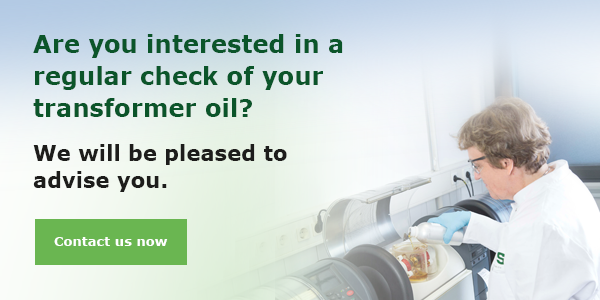To find the best laboratory service provider for your needs, request quotations from various laboratories. But what do you need to consider? That the lab has the necessary certifications and that the price for the lab's services is reasonable. But what else is important? Learn more in this blog article.
2 Guidelines, 3 test groups: The standard for laboratory services for transformer oils
A sound condition assessment of insulating oils in transformers and tap-changers is based on two guidelines:
-
IEC 60422, standard on the monitoring and maintenance of mineral oil-based insulating oils in electrical equipment; and
-
IEC 61203, standard on the maintenance of transformer esters in operating equipment.
The condition of the insulating fluid in transformers influences its performance and makes regular inspection necessary.
A distinction is made between three test groups:
Test group 1: Routine tests
They represent the minimum scope of transformer oil monitoring and regularly examine the progressive ageing of the oil. As a rule, chemical, physical and electrical properties of the transformer oil are examined in this test group.
Test group 2: Supplementary tests
This is where further information about the quality of the transformer oil is determined. For example, if anomalies such as a changed breakdown voltage or acidity were detected during a routine test.
Test group 3: Investigative tests
After malfunction of the transformers or abnormalities with regard to temperature behaviour or noise level, conclusions on faults can be drawn with extended laboratory tests without having to shut down or disassemble the transformers immediately. Examples of these laboratory tests are the gas-in-oil analysis (DGA) or the furan analysis.
Transformer oil analysis: How to choose the right laboratory service provider
Among other things, the water and acid content, the breakdown voltage and the conductivity as well as the dielectric loss factor of the insulating oil are examined, and suspended solid is also analysed. The causes for the formation of fault gases or soluble polar impurities are also determined.
Important goals for all analyses are to ensure operational safety, to avoid operational malfunctions and to ensure the quality of the analysis results. This is not possible without the experience of certified companies and laboratories.
When choosing a laboratory service, ask yourself the following questions:
-
Is the laboratory certified and are its staff also technically competent and experienced?
-
Has the sampling been carried out professionally and representatively, and has its transport to the laboratory been carried out correctly and promptly?
-
Are the company procedures for handling oil samples submitted clearly defined?
-
What about the regular calibration of the analytical equipment in the laboratory and its protocol?
-
Does the laboratory offer the analyses requested?
-
How long are the processing times?
-
What are the quotation, communication and subsequent performance and reporting or documentation like?
-
Is the laboratory able to pass on direct recommendations for action based on the analysis?
Or are you one step ahead and already know that a change of transformer oil is due? Then we recommend this article:
Conclusion
In order to be able to make well-founded decisions on inspection and maintenance measures to be carried out in connection with transformers, we at Electrical Oil Services are happy to make our many years of experience available to you. Take advantage of this information - it's worth it!
Good to know: If you have a sample from another service provider but no recommendation for action, you are welcome to contact EOS® . We will evaluate this analysis for you and make well-founded recommendations directly from practice.
Read more in this article:
If you have any questions, we look forward to receiving your request:





